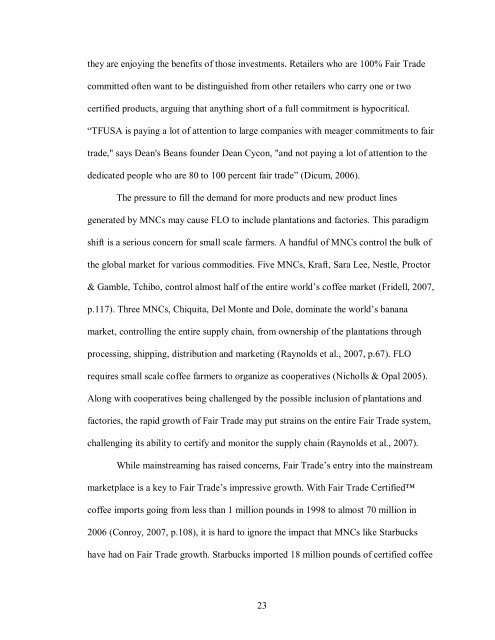The Challenges of Marketing Fair Trade - Wynne, Sandy
The Challenges of Marketing Fair Trade - Wynne, Sandy
The Challenges of Marketing Fair Trade - Wynne, Sandy
Create successful ePaper yourself
Turn your PDF publications into a flip-book with our unique Google optimized e-Paper software.
they are enjoying the benefits <strong>of</strong> those investments. Retailers who are 100% <strong>Fair</strong> <strong>Trade</strong><br />
committed <strong>of</strong>ten want to be distinguished from other retailers who carry one or two<br />
certified products, arguing that anything short <strong>of</strong> a full commitment is hypocritical.<br />
“TFUSA is paying a lot <strong>of</strong> attention to large companies with meager commitments to fair<br />
trade," says Dean's Beans founder Dean Cycon, "and not paying a lot <strong>of</strong> attention to the<br />
dedicated people who are 80 to 100 percent fair trade” (Dicum, 2006).<br />
<strong>The</strong> pressure to fill the demand for more products and new product lines<br />
generated by MNCs may cause FLO to include plantations and factories. This paradigm<br />
shift is a serious concern for small scale farmers. A handful <strong>of</strong> MNCs control the bulk <strong>of</strong><br />
the global market for various commodities. Five MNCs, Kraft, Sara Lee, Nestle, Proctor<br />
& Gamble, Tchibo, control almost half <strong>of</strong> the entire world’s c<strong>of</strong>fee market (Fridell, 2007,<br />
p.117). Three MNCs, Chiquita, Del Monte and Dole, dominate the world’s banana<br />
market, controlling the entire supply chain, from ownership <strong>of</strong> the plantations through<br />
processing, shipping, distribution and marketing (Raynolds et al., 2007, p.67). FLO<br />
requires small scale c<strong>of</strong>fee farmers to organize as cooperatives (Nicholls & Opal 2005).<br />
Along with cooperatives being challenged by the possible inclusion <strong>of</strong> plantations and<br />
factories, the rapid growth <strong>of</strong> <strong>Fair</strong> <strong>Trade</strong> may put strains on the entire <strong>Fair</strong> <strong>Trade</strong> system,<br />
challenging its ability to certify and monitor the supply chain (Raynolds et al., 2007).<br />
While mainstreaming has raised concerns, <strong>Fair</strong> <strong>Trade</strong>’s entry into the mainstream<br />
marketplace is a key to <strong>Fair</strong> <strong>Trade</strong>’s impressive growth. With <strong>Fair</strong> <strong>Trade</strong> Certified<br />
c<strong>of</strong>fee imports going from less than 1 million pounds in 1998 to almost 70 million in<br />
2006 (Conroy, 2007, p.108), it is hard to ignore the impact that MNCs like Starbucks<br />
have had on <strong>Fair</strong> <strong>Trade</strong> growth. Starbucks imported 18 million pounds <strong>of</strong> certified c<strong>of</strong>fee<br />
23


